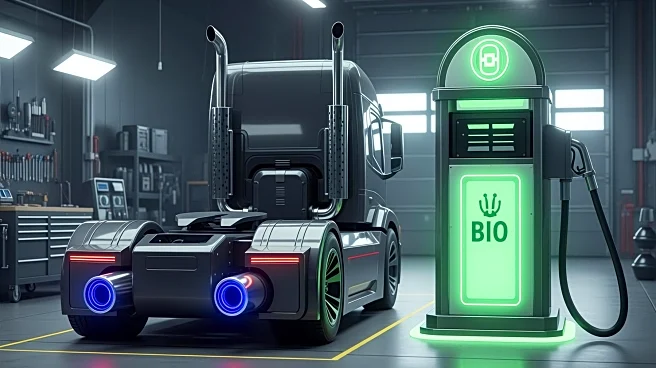What's Happening?
Fleet manufacturers are preparing for 2026 with a focus on refining diesel engines and expanding alternative fuel options. Despite the slow adoption rates of electric vehicles (EVs) and infrastructure challenges, diesel engines remain central to heavy-duty
and medium-duty segments. Manufacturers are enhancing these engines to achieve unprecedented levels of efficiency and performance. The industry is also witnessing a transition towards alternative fuels, including battery-electric vehicles, natural gas, and biofuels. This shift aims to reduce emissions and future-proof fleet operations. The 2026 Fleet Vehicle Guide highlights new and updated models featuring next-generation diesel engines, advanced safety technologies, and driver-centric designs. It provides a comprehensive overview of vehicles shaping the industry, offering fleet executives a range of choices to optimize performance and compliance.
Why It's Important?
The focus on diesel efficiency and alternative fuels is crucial for the fleet industry as it navigates changing regulations and economic pressures. Diesel engines continue to be vital for heavy-duty operations, providing reliability and performance. However, the push towards cleaner powertrains reflects a broader industry trend towards sustainability. Fleet operators stand to benefit from reduced emissions and operational costs, while manufacturers can capitalize on emerging market opportunities. The transition to alternative fuels also aligns with global efforts to combat climate change, positioning the fleet industry as a key player in environmental stewardship. As fleets adapt to these changes, they can enhance their competitiveness and meet evolving consumer and regulatory demands.
What's Next?
Fleet manufacturers are expected to continue refining diesel engines and expanding alternative fuel options. The industry may see increased investment in EV infrastructure to address adoption barriers. Fleet executives will need to balance traditional and emerging powertrains to optimize performance and compliance. As new models are introduced, fleet operators will have opportunities to upgrade their vehicles, potentially leading to increased demand for cleaner technologies. The ongoing development of alternative fuels and advanced safety technologies will likely drive innovation and shape the future of fleet operations.
Beyond the Headlines
The shift towards alternative fuels and enhanced diesel engines may have broader implications for the automotive industry and environmental policy. As fleets adopt cleaner technologies, there could be a ripple effect on related sectors, such as logistics and transportation. The emphasis on sustainability may also influence consumer preferences, driving demand for eco-friendly products and services. Additionally, the transition could prompt regulatory changes, encouraging further investment in green technologies and infrastructure.















